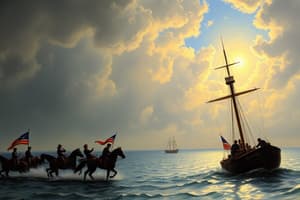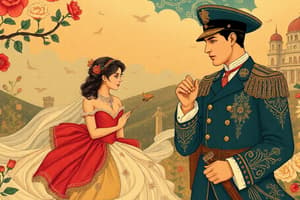Podcast
Questions and Answers
What was the primary advocacy of W.E.B. Du Bois?
What was the primary advocacy of W.E.B. Du Bois?
- Vocational education for African Americans
- Isolation from foreign conflicts
- Economic self-reliance
- Immediate civil rights and higher education (correct)
The Spanish-American War lasted six months.
The Spanish-American War lasted six months.
False (B)
What major event led to the U.S. declaring war on Spain during the Spanish-American War?
What major event led to the U.S. declaring war on Spain during the Spanish-American War?
The explosion of the USS Maine
The ________ Amendment prevented the U.S. from annexing Cuba after the Spanish-American War.
The ________ Amendment prevented the U.S. from annexing Cuba after the Spanish-American War.
Match the following terms with their definitions:
Match the following terms with their definitions:
Which of the following best describes yellow journalism?
Which of the following best describes yellow journalism?
The Platt Amendment allowed for U.S. intervention in Cuban affairs when necessary.
The Platt Amendment allowed for U.S. intervention in Cuban affairs when necessary.
Who led the Rough Riders during the Spanish-American War?
Who led the Rough Riders during the Spanish-American War?
What was the primary purpose of the Panama Canal when it was completed in 1914?
What was the primary purpose of the Panama Canal when it was completed in 1914?
The Sussex Pledge was Germany's commitment to unrestricted submarine warfare during WWI.
The Sussex Pledge was Germany's commitment to unrestricted submarine warfare during WWI.
Name one reason that marked a shift in U.S. foreign policy from isolationism to global involvement during WWI.
Name one reason that marked a shift in U.S. foreign policy from isolationism to global involvement during WWI.
The __________ Act restricted anti-war speech and dissent during WWI.
The __________ Act restricted anti-war speech and dissent during WWI.
Match the following acts and agencies to their primary functions during WWI:
Match the following acts and agencies to their primary functions during WWI:
What was a main reason Republicans opposed the League of Nations?
What was a main reason Republicans opposed the League of Nations?
The United States signed the Treaty of Versailles after World War I.
The United States signed the Treaty of Versailles after World War I.
Who was the U.S. president who went on a speaking tour to promote the League of Nations?
Who was the U.S. president who went on a speaking tour to promote the League of Nations?
Republican candidate __________ won the 1920 election and opposed the League of Nations.
Republican candidate __________ won the 1920 election and opposed the League of Nations.
Match the following terms with their definitions or contexts:
Match the following terms with their definitions or contexts:
What was a major postwar issue in the United States following WWI?
What was a major postwar issue in the United States following WWI?
The era following World War I was marked by a lack of new amendments to the Constitution.
The era following World War I was marked by a lack of new amendments to the Constitution.
After WWI, many Americans experienced __________, leading to a reluctance to ally with other nations.
After WWI, many Americans experienced __________, leading to a reluctance to ally with other nations.
What was the primary focus of muckrakers during the Progressive Era?
What was the primary focus of muckrakers during the Progressive Era?
Teddy Roosevelt was known for his efforts to strengthen the executive branch during his presidency.
Teddy Roosevelt was known for his efforts to strengthen the executive branch during his presidency.
What platform did Woodrow Wilson run on during the election of 1912?
What platform did Woodrow Wilson run on during the election of 1912?
The _______ Amendment allowed for the direct election of senators.
The _______ Amendment allowed for the direct election of senators.
Match the following amendments with their purposes:
Match the following amendments with their purposes:
Which act was created to ensure the sanitary conditions of meatpacking?
Which act was created to ensure the sanitary conditions of meatpacking?
The Pure Food and Drug Act aimed to prohibit the sale of mislabeled food and drugs.
The Pure Food and Drug Act aimed to prohibit the sale of mislabeled food and drugs.
Name one key component of the Square Deal established by Teddy Roosevelt.
Name one key component of the Square Deal established by Teddy Roosevelt.
_______ diplomacy refers to using money to achieve foreign policy goals.
_______ diplomacy refers to using money to achieve foreign policy goals.
Who was the only Republican candidate in the election of 1912?
Who was the only Republican candidate in the election of 1912?
Flashcards
"Walk softly carry big sticks"
"Walk softly carry big sticks"
The US foreign policy approach under Theodore Roosevelt, emphasizing a strong military presence and diplomacy backed by force.
Panama Canal
Panama Canal
A man-made waterway connecting the Atlantic and Pacific Oceans, finished in 1914. It boosted US economic and military power by facilitating global trade and naval mobility.
Sussex Pledge
Sussex Pledge
Germany's pledge to limit unrestricted submarine warfare in 1916, aiming to avoid US entry into WWI. However, Germany violated the pledge, leading to the US's involvement in the war.
Committee on Public Information
Committee on Public Information
Signup and view all the flashcards
Espionage Act and Sedition Act
Espionage Act and Sedition Act
Signup and view all the flashcards
Booker T. Washington's Approach
Booker T. Washington's Approach
Signup and view all the flashcards
W.E.B. Du Bois' Approach
W.E.B. Du Bois' Approach
Signup and view all the flashcards
Isolationism
Isolationism
Signup and view all the flashcards
Expansionism
Expansionism
Signup and view all the flashcards
Imperialism
Imperialism
Signup and view all the flashcards
Intervention
Intervention
Signup and view all the flashcards
Yellow Journalism
Yellow Journalism
Signup and view all the flashcards
Spanish-American War
Spanish-American War
Signup and view all the flashcards
Muckrakers
Muckrakers
Signup and view all the flashcards
Square Deal
Square Deal
Signup and view all the flashcards
Dollar Diplomacy
Dollar Diplomacy
Signup and view all the flashcards
New Nationalism
New Nationalism
Signup and view all the flashcards
New Freedom
New Freedom
Signup and view all the flashcards
Federal Reserve Act
Federal Reserve Act
Signup and view all the flashcards
Clayton Anti-Trust Act
Clayton Anti-Trust Act
Signup and view all the flashcards
Sixteenth Amendment
Sixteenth Amendment
Signup and view all the flashcards
Meat Inspection Act
Meat Inspection Act
Signup and view all the flashcards
Pure Food and Drug Act
Pure Food and Drug Act
Signup and view all the flashcards
League of Nations
League of Nations
Signup and view all the flashcards
American Isolationism Post WWI
American Isolationism Post WWI
Signup and view all the flashcards
U.S. and the Treaty of Versailles
U.S. and the Treaty of Versailles
Signup and view all the flashcards
Divided Government
Divided Government
Signup and view all the flashcards
Red Scare
Red Scare
Signup and view all the flashcards
Direct Democracy
Direct Democracy
Signup and view all the flashcards
Initiatives
Initiatives
Signup and view all the flashcards
Recall
Recall
Signup and view all the flashcards
Study Notes
Muckrakers
- Journalists who exposed corruption, poor labor conditions, and societal issues
- Fueled Progressive Era reforms by raising public awareness and pressuring politicians to act
- Scooped muck and raked it
Square Deal
- Aggressive reforms benefited everyone
- Focused on monopolies, labor unions, consumer protection, environmental concerns, and expanded democracies
- Involved getting involved to find solutions for all nations
- Exposed disgusting conditions in the meatpacking industry through "The Jungle"
- Establishing secret ballot to decrease intimidation
Teddy Roosevelt
1st Term
- Dynamic energy, key of his character
- First president since Lincoln to use the full power of the executive branch
2nd Term
- First president since Lincoln to use the full power of the executive branch
- Establishes Square Deal
Return
- Part of "new nationalism"
- Strict regulations on large corporations
- Greater protection for women and children in the industry
- Direct improvement in democracy
- Runs in 3rd party as "Bull-Moose" party because Taft was doing poorly
William Howard Taft
- Didn't want to run for a third term
- Constant disagreements with Congress and other progressives.
- TR endorsed Taft.
- Known for getting stuck in his bathtub.
- Did not live up to Roosevelt's and others' expectations.
- Roosevelt ran again as a third party
- Maintained some progressive reforms
Dollar Diplomacy
Studying That Suits You
Use AI to generate personalized quizzes and flashcards to suit your learning preferences.




